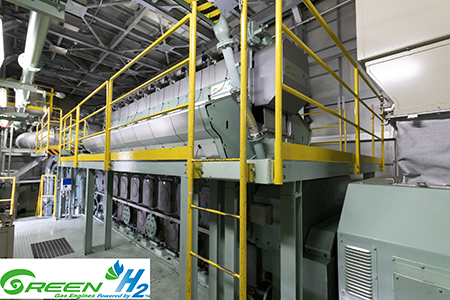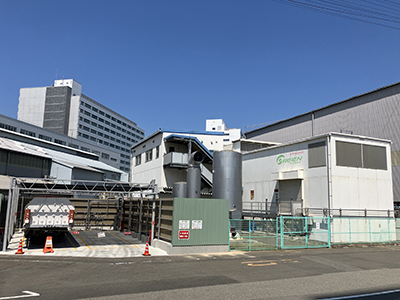Kawasaki Successfully Completes Japan’s First Operational Test Run with Thirty-percent-hydrogen Mixed-fuel Large Gas Engine
Jul. 29, 2024


Tokyo, July 29, 2024 — Kawasaki Heavy Industries, Ltd. announced today its successful completion of an operational test run for Japan’s first 30% hydrogen (ratio to city gas) mixed-fuel large gas engine (engine model: KG-18-T; rated output: 7.5 MW). Now, the company will proceed with combustion control optimization and other adjustments with the goal of full operational commencement in October 2024.
Characteristics of Kawasaki’s hydrogen mixed-fuel large gas engine:
| - | Includes a high-pressure hydrogen gas trailer for supplying hydrogen and a unit for mixing hydrogen with city gas at a ratio of between 5 and 30% in volume |
| - | Safety measures in consideration of hydrogen’s highly ignitable characteristics and the possibility of leaks include a gas detector that can properly detect hydrogen leaks, a nitrogen purging system for the vent line, and other features |
| - | IDesigned with as few modifications as possible to facilitate easy retrofit modifications in the future for existing KG-18-T city gas engines to accommodate mixed-fuel combustion using hydrogen |
Compared with city-gas-only combustion, mixed-fuel combustion with a 30% hydrogen-to-city-gas ratio achieves a CO2 emissions reduction of approximately 1,150 metric tons,*1 which is equivalent to the annual emissions of roughly 420 households. In 2025, Kawasaki is planning a market release for the hydrogen mixed-fuel combustion Kawasaki Green Gas Engine*2 model, as well as the start of existing-engine modification services to enable mixed-fuel combustion using hydrogen. Moving forward, Kawasaki will continue working toward the goal of carbon neutrality through applications of hydrogen-related technologies in currently operational Kawasaki gas engines and development of other new hydrogen-energy utilization methods.
| *1 | When operated at a power generation output of 7,500 kW for an annual total of 4,000 hours, with a CO2 emission factor of 2.29 kg CO2/Nm3 |
| *2 | Kawasaki Green Gas Engine: An engine developed in-house by Kawasaki based on the concepts of high efficiency and low nitrogen oxide (NOx) emissions, which achieves power generation operations boasting the world’s most efficient performance in its output class. Kawasaki’s gas engines offer excellent startup performance enabling attainment of maximum generation output within five minutes of start command issuance, which will be an important factor in facilitating effective responses to demand fluctuations in power supply networks as renewable energy becomes more widespread in the future. |
Related Links
Kawasaki Builds Japan’s First Thirty-percent-hydrogen Mixed-fuel Large Gas Engine Verification Testing Facility(April 15, 2024)
https://global.kawasaki.com/en/corp/newsroom/news/detail/?f=20240415_6067
Kawasaki Develops Thirty-percent-hydrogen Mixed-fuel Combustion Technology for Large Gas Engines (March 16, 2022)
https://global.kawasaki.com/en/corp/newsroom/news/detail/?f=20220316_5173
Product information
Gas Engines | Kawasaki Heavy Industries
Toward the Realization of a Hydrogen Society
Toward the Realization of a Hydrogen Society | Kawasaki Heavy Industries
Contact
If you need more information about our business,
please feel free to contact us.





